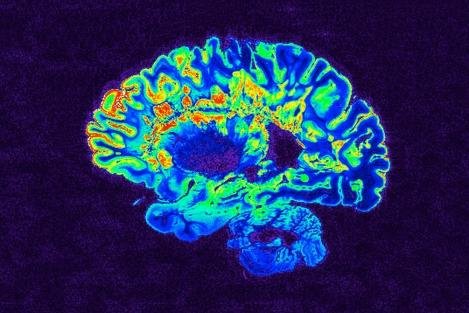An MRI scan shows the brain of a person with multiple sclerosis. A Phase II clinical trial showed that an antihistamine can restore nervous system function in patients with chronic multiple sclerosis.Photo courtesy of NIH
Oct. 11 (UPI) -- A Phase II clinical trial showed that an antihistamine can restore nervous system function in patients with chronic multiple sclerosis.
Researchers from the University of California, San Francisco, completed the clinical trial of the U.S. Food and Drug Administration-approved antihistamine clemastine fumarate on patients with MS.
The study, published Tuesday in The Lancet, was the first to show a drug is capable of reliably restoring brain function damaged by a neurological disease in human patients.
"To the best of our knowledge this is the first time a therapy has been able to reverse deficits caused by MS. It's not a cure, but it's a first step towards restoring brain function to the millions who are affected by this chronic, debilitating disease," Dr. Ari Green, professor of Neurology, chief of the Division of Neuroinflammation and Glial Biology, and medical director of the UCSF Multiple Sclerosis and Neuroinflammation Center, said in a news release.
MS is an autoimmune neurodegenerative disorder affecting nearly 2.5 million people worldwide. It occurs when the immune system attacks myelin, the layers of fatty insulating membrane that surround nerve fibers. Myelin helps electrical signals in neurons move faster and more efficiently, but when it is damaged, neurons lose their ability to transmit electrical signals -- causing vision loss, weakness, difficulty walking and coordination and balance problems.
Current treatments for MS work to prevent the immune system from doing more damage to myelin but none repair the damage already done.
Previous studies from the UCSF team showed that clemastine fumarate promotes myelin regeneration and can restore neural function and inspired the new study, the ReBUILD trial.
Researchers used the visual evoked potentials, or VEPs, method in the five-month trial of 50 patients with relapsing MS. The visual system is one of the first and more prominent areas of the brain to be affected by MS and the VEPs method is known as a reliable test to measure the speed of neural transmission in the areas of the brain responsible for vision. The participants' VEPs showed preexisting deficits in neural transmission.
Researchers showed the study participants flickering patterns on a screen and used electrodes placed over the brain's visual area at the back of the head to determine how long it took for the flickering signal in the eye to generate an electrical response detected by the electrodes.
Results showed that during the periods when participants were taking the drug, the neural signal from the eye to the back of the brain was significantly faster over the baseline measurements taken before the patients started the study.
"This is the first step in a long process," Green said. "By no means do we want to suggest that this is a cure-all. We want to ground-truth myelination metrics - we're designing the crucible that's going to be used to test any future method for detecting remyelination."















